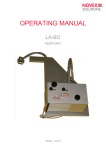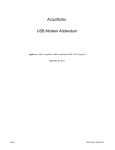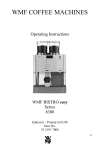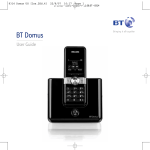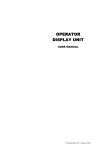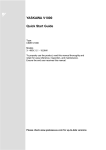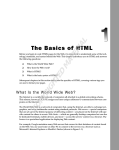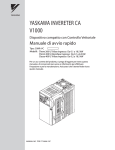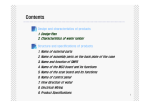Download Avery ALS 256 User manual
Transcript
USER MANUAL Applies to the applicator type: LA-BO USER MANUAL Rev. 2.1, Release 10 /2007 © 2007, Avery Dennison Deutschland GmbH, Postfach 1163, 85385 Eching, Germany.All rights reserved. General notes & Safety instructions Specifications Mounting & setting the LA-BO Servicing the LA-BO Spare parts Fig.: LA-BO applicator (Shipped version may deviate from the picture) 2 10/07 Rev. 2.1 USER MANUAL LA-BO 3 10/07 Rev. 2.1 USER MANUAL LA-BO General notes & Safety instructions.…………..5 General notes .....................................................................6 Validity and binding effect of this manual ........................6 Illustrations and descriptions ...........................................7 Safety instructions ..............................................................8 Information and qualifications .........................................8 Operational safety of the unit ..........................................9 Specifications………………….………………..………11 Application Notes ..............................................................12 Intended Purpose .........................................................12 System Requirements ...................................................12 Properties ......................................................................13 Mode of Operation ........................................................13 Specifications ................................................................14 Index .................................................................................15 Mounting & setting the LA-BO….……….……….17 Safety instructions ............................................................18 Mounting on an ALX 92x ..................................................19 Required components ..................................................19 Required tools ..............................................................19 Fitting the applicator .....................................................20 Adjusting the dispensing edge to the vacuum grid .......21 Adjusting the parameter settings on the ALX 92x ........22 Mounting on an ALS 20x/256 ...........................................23 Required components ..................................................23 Required tools ..............................................................23 Fitting the applicator .....................................................24 Adjusting the dispensing edge to the vacuum grid .......25 Adjusting the parameter settings on the ALX 20x ........26 Adjusting the labeling application height ...........................27 Adjusting the LA-BO to the used label material ................28 Adjusting the sliding bars in the vacuum grid ...............28 Adjusting the air nozzles in the vacuum grid ................30 Adjusting the air stream support ...................................31 Setting the dispensing position parameter ....................32 Initializing the applicator ...............................................32 Compressed air settings ...............................................33 Index…………………………………………………………...34 4 10/07 Rev. 2.1 USER MANUAL LA-BO Servicing the LA-BO……………….………………….35 Pre-installation on the ALX 92x......................................36 Replacing the fan ...........................................................38 Replacing slide bars ......................................................39 Regular maintenance.....................................................40 Recommended Sparepart .............................................41 Spareparts…………………………………………………..42 5 10/07 Rev. 2.1 USER MANUAL LA-BO General notes & Safety instructions General notes ................................................ 6 Validity and binding effect of this manual ... 6 Illustrations and descriptions ...................... 7 Safety instructions ......................................... 8 Information and qualifications .................... 8 Operational safety of the unit ..................... 9 6 10/07 Rev. 2.1 USER MANUAL LA-BO General notes Validity and binding effect of this manual Contents The present manual refers exclusively to the LA-BO applicator. It is written for the purpose of ensuring professional usage and calibration of the unit. Prerequisites for the use and adjustment are the professional installation and configuration of the unit. For any technical questions you may have that are not described in the user manual, see: • The service chapter of this manual. or • Request a service technician from one of our sales partners. Our service technicians are available to assist you, particularly with configuring the unit as well as in the case of malfunctions. Technical status: 10/2007 Copyright Avery Dennison holds all rights to this manual and its appendixes. Reproduction, reprinting or any other types of duplication, even of portions of this manual, may only be carried out with express written consent. Third persons, in particular competitors, should not be given access to the information in this manual. Printed in Holland Manufacturer Avery Dennison Deutschland GmbH Ohmstrasse 3 85386 Eching, Germany Phone: +49-8165-925-0 Fax: +49-8165-3143 http://www.machines.averydennison.com Avery Dennison reserves the right: • To make modifications to construction parts, components and software, as well as to employ comparable components in place of the parts specified, in keeping with technical advances. • To modify information in this document. No commitment will be made to expand these modifications to include any units delivered earlier. 7 10/07 Rev. 2.1 USER MANUAL LA-BO Illustrations and descriptions Dangers and risk notes Important directions that you must absolutely observe are particularly emphasized: WARNING! A warning refers to risks that can lead to serious injury or death! The warning contains safety measures to protect the relevant persons. Always follow the instructions. Figures Texts are accompanied by figures where necessary. Generally, the LA-BO unit shown is a right-handed version. The left-handed version is only shown where it is necessary to differentiate between the two. 8 10/07 Rev. 2.1 USER MANUAL LA-BO Safety instructions Information and qualifications Follow the instructions WARNING! Safe and efficient operation of the LA-BO unit can only be guaranteed if you observe all necessary information. Product liability and warranty claims can only be asserted if the unit was operated in accordance with the directions in the manual. • Before operating the unit, read the operating instructions and all other notes carefully. • Observe the additional safety and warning notes on the LA-BO unit. • Only permit competent people to operate and configure this unit. • When working with the LA-BO for a longer period, it is advisable to use hearing protection. Keep the product information at hand With respect to this manual: • It should be kept at the location where the unit is installed and be available to the operator. • It should always be legible. • If the unit is sold, the manual should be made available to the new owner. • The safety and warning notes affixed to the unit itself must be kept clean and legible. Missing or damaged signs must be replaced. Ensure the required qualifications are met • Ensure that only trained and authorized personnel operate, configure and service the unit. • Only allow qualified and well-trained expert personnel or service technicians to perform configurations. • The responsibilities with regard to operation, configuration and maintenance should be clearly defined and consistently maintained. • In addition, personnel should also be instructed on a regular basis in matters of occupational safety and environmental protection. Qualification for operation The instruction of personnel using the unit must ensure that: • The operating personnel can use the unit on their own and safely. • The operating personnel can remedy small operational disruptions on their own. • At least two people must be instructed in the unit’s usage. • Enough label material must be provided for testing and instructional purposes. 9 10/07 Rev. 2.1 USER MANUAL LA-BO Operational safety of the unit Proper usage Applicators of type LA-BO are additional units for Avery Dennison print-andapply or labelling heads. The applicators take self-adhesive labels from the dispenser mechanism and stick these onto moving or non-moving products. The company operating the unit must install it with suitable equipment to protect operating personnel from danger; for example, the danger of hands or fingers being crushed by reaching in between the product and the dispensing edge. WARNING! Improper usage of the unit can cause accidents, property damage and production downtime! • Only use the unit in accordance with the instructions specified in this manual. • Only configure the unit in accordance with this manual and with the required care. • Only use original accessories. • Do not make any modifications or alterations to the unit. • Repairs to the device may only be performed by authorised specialists who are aware of the risks involved. Protection against injuries by electrical current Applicators of type LA-BO operate using low voltage 24 V DC supplied by Avery Dennison print-and-apply or labelling heads. WARNING! • Never connect the LA-BO unit directly to mains voltage! • Only operate the unit once the housing has been reassembled properly. • Before cleaning, switch off the Avery Dennison print-and-apply or labelling head and remove the power cable from the socket. WARNING! The unit is not protected against splashing water. • Keep the unit dry. • If liquids have penetrated the LA-BO unit, switch the Avery Dennison print-and-apply or labelling head off and disconnect or unplug it’s power cable immediately. Inform a service technician. Protection against injuries by mechanical action WARNING! Risk of injury due to moving and rapidly rotating parts! • Long hair, loose jewellery, long sleeves and so on are not permissible when using the unit. • Sufficient protective clothing must be worn. 10 10/07 Rev. 2.1 USER MANUAL LA-BO • Keep moving parts free from obstructions even when the unit is not switched on, if there is a chance the machine might be turned on. • Switch off the machine before making any mechanical settings. • Do not wear ties, loose clothing, jewellery, wrist watches or similar items on your person when near the operating unit. WARNING! There is a low risk that you may get your hands crushed between the vacuum grid of the LA-BO and the conveyed products! • Never reach between the product and the LA-BO edge while the unit is in operation or ready for operation. Protection against injuries by chemicals CAUTION! Operating materials such as cleaning agents or the solvents in glues can be damaging to health. • Always follow the instructions, use and safety regulations specified by the manufacturer! 11 10/07 Rev. 2.1 USER MANUAL LA-BO Specifications Application Notes ........................................... 12 Intended Purpose ....................................... 12 System Requirements ................................ 12 Properties ................................................... 13 Mode of Operation ..................................... 13 Specifications ............................................. 14 Index .............................................................. 15 12 10/07 Rev. 2.1 USER MANUAL LA-BO Application Notes Intended Purpose Applicators of type LA-BO are additional units for print-and-apply or labelling heads that are listed in the section "Device type". They take self-adhesive labels from the dispenser mechanism and stick these onto moving or nonmoving products. The LA-BO is mounted to the print-and-apply (ALX 92x) or labelling head (ALS 20x/256) by means of an included base plate. The applicator is controlled by the optional Applicator Interface (AI) board (mandatory for ALX and optional for ALS) or by the Internal Applicator Interface (ALS only). The electrical connection to the LA-BO is done via a plug connector. The drive is provided by compressed air. Remark: The optional Applicator Interface (AI) board is not included with the LA-BO and has to be ordered separately with the print-and-apply or labelling head. The application process is triggered by means of a product sensor, which is also connected to the AI-board. Installation position Permissible installation positions for the LA-BO are: • Vertical, if application takes place from top to bottom (also referred to as “top labelling”: the product is located below the applicator) or from bottom to top (also referred to as “bottom labelling”: the product is located above the applicator). • Horizontal (also referred to as “side labelling”: the product is located next to the applicator) System Requirements The LA-BO can be operated on the following devices: Device type Device Part number LA-BO Controller ALX 924/925/926 LH2 A8679 AI1/2 (A5032/A5207) ALX 924/925/926 RH2 A8680 AI1/2(A5032/A5207) ALS 204/206/256 LH3 A8677 AI1/2(A7063) ALS 204/206/256 RH3 A8678 AI1/2 (A7063) Tab. 1: Print-and-Apply and labelling heads, to which the LA-BO can be applied (LH = lefthand, RH = righthand, AI=Applicator Interface). 1) The Applicator Interface (AI) is not contained in the scope of delivery and has to be ordered separately with the ALX or ALS unit.. A5032 : AI factory installed, A5207 AI Upgrade kit 2) Use of the AI is mandatory for ALX. Use of the AI is optional for the ALS. The Internal Applicator Interface of the ALS can be used also, but limits the use of PLC signals. 3) ALX 924/925/926 has to be equiped with standard dispensing edge 4) ALS 20x/256/256 has to be equiped with L-shape fixed dispensing edge 13 10/07 Rev. 2.1 USER MANUAL LA-BO By ordering the specified part number, you will receive a LA-BO applicator with installation material and connection cables, suitable for installation on the device type listed at the beginning of the line. The Applicator Interface (AI) board is not part of the delivery and has to be ordered separately. Firmware Required version of the ALX 92X firmware: V3.30 or later. Required version of the ALS 20X/256 firmware: V1.17 or later. AI The printer-dispenser must be equipped with an Application Interface (AI) board version V1.11 or later. Start signal The start signal must be connected to the Product sensor input of the AI interface. When the Internal Applicator interface on the ALS is used, the startsignal must be connected to the M12-connector “ Start” P See service manual ALX 92x/ALS 20X/256/256, ‘Applicator Interface’ topic section, chapter ‘Interface signals’, ‘Product Sensor’. For using the M12 connector on ALS see Service manual ALS 20x/256 ‘ Connecting the sensors’. Properties LA-BO = Label Applicator – Blow On The applicator is driven by compressed air. The label is held to the aluminium grid on the bottom side of the applicator by an inwards airflow created by a fan on the side of the applicator. Mode of Operation The fan in the LA-BO is continuously powered, creating a strong inwards airflow through the aluminium vacuum grid at the bottom side. While a label is dispensed, the small blow pipe is activated, creating a small focused air stream to force the label against the aluminium grid. When the label is fully dispensed, it is held onto the aluminium grid by the inwards airflow and is then stand-by to blow off the label. When the application cycle is triggered by the product sensor, a high volume air pressure is applied through the air nozzles built-in above the aluminium grid. The nozzles which are not covered by the black sliding bars will now blow off the label towards the product at a high velocity. After that, the next label can be dispensed on the grid. 14 10/07 Rev. 2.1 USER MANUAL LA-BO Specifications LA-BO applicator Material type Label size Application distance Application capacity Product speed Self-adhesive labels of paper, PE or PP Min. 30 x 30 mm Max. 100 x 100 mm Min. 20 mm Max. 100 mm 1 2 Up to 160 labels/min From 0 up to 120 m/min 3 90° +/- 10° Application angle 2 Application accuracy Typically +/- 1 mm Control Applicator Interface Compressed air 5-6 bar Air consumption Appr. 1 ltr/apply cycle Dimensions ALX 92x: 300 x 345 x 153 mm ALS 20x/256: 357 x 188 x 153 mm 3,5 kg Weight Environmental conditions Enclosed rooms Working temperature: 5 to 40°C Storage temperature: 0 to 60°C Relative humidity: 30 to 80%, non-condensing Protection class IP 21 Power consumption 15 VA Supply voltage 24 V DC (from ALX or ALS) Noise level 82 dB(A) during blow cycle Tab. 2: Technical specifications of the LA-BO. 1) depending on label size 2) depending on label size and time necessary for trailing edge of label to be released from backing paper 3) Depending on labelsize, blow distance, productsurface and accuracy. 15 10/07 Rev. 2.1 USER MANUAL LA-BO Index A I Applicator Interface 13 Installation position 12 Intended Purpose 12 L LA-BO, properties 13 F S Firmware 13 Specifications 14 16 10/07 Rev. 2.1 USER MANUAL LA-BO 17 10/07 Rev. 2.1 USER MANUAL LA-BO Mounting & setting the LA-BO Safety instructions .........................................................18 Mounting on an ALX 92x ...............................................19 Required components ...................................................19 Required tools ...............................................................19 Fitting the applicator ......................................................20 Adjusting the dispensing edge to the vacuum grid ........21 Adjusting the parameter settings on the ALX 92x .........22 Mounting on an ALS 20x/256 ........................................23 Required components ...................................................23 Required tools ...............................................................23 Fitting the applicator ......................................................24 Adjusting the dispensing edge to the vacuum grid ........25 Adjusting the parameter settings on the ALX 20x/256 ..26 Adjusting the labeling application height ........................27 Adjusting the LA-BO to the used label material .............28 Adjusting the sliding bars in the vacuum grid ................28 Adjusting the air nozzles in the vacuum grid .................30 Adjusting the air stream support ....................................31 Setting the dispensing position parameter .....................32 Initializing the applicator ................................................32 Compressed air settings ................................................33 Index ..............................................................................34 18 10/07 Rev. 2.1 USER MANUAL LA-BO Safety instructions WARNING! The applicator uses a large air flow to blow off the label which is held at the bottom side of the applicator. – Don’t look straight in to the vacuum grid of the running applicator, to avoid that dust or label residues are blown into your eyes. – When setting the applicator: make sure that the applicator cannot be triggered unintentionally. • When mounting, dismounting or servicing the LA-BO, make sure the labelling head ALX 92x or ALS 20x/256 and the air pressure are switched off! • The operating air pressure must be at least 5 bars and no more than 6 bars. • The applicator may only be assembled and commissioned by qualified personnel. • The applicator housing may only be opened by authorized technicians. • Repairs to the applicator may only be performed by authorized technicians who are aware of the risks involved! • Check the applicator regularly for defective parts. Replace defective parts immediately and only by original spare parts provided by the manufacturer. By doing so, you avoid hazards caused by spare parts of low quality. • The applicator construction must not be modified (e.g. by installing a larger pneumatic valve). Unauthorized modifications, changes or improper usage exclude all liability on the part of the manufacturer for damage resulting there of. 19 10/07 Rev. 2.1 USER MANUAL LA-BO Mounting on an ALX 92x Required components Component Basic Module LA-BO Part number A8679 (LH) or A8680 (RH) Bolt Set (3x screw ISO 7380 M5x20) Filter regulator included Picture included Tab. 1: These parts are required to mount the LA-BO on an ALX 92x. Required tools • Allen key 3 mm • Small size screwdriver ATTENTION : For ALX 92x supplied before May 2007, 3 mounting holes have to be drilled in the ALX 92x groundplate. Please refer to User manual page 36 for detailed instructions. 20 10/07 Rev. 2.1 USER MANUAL LA-BO Fitting the applicator 1. Pull out the black top-left knob (1) and turn the LA-BO housing in the upper position (2). 2. Bolt the base plate of the applicator onto the base plate of the ALX 92x (3x M5x20). 3. Plug the cable of the LA-BO into the D-sub connector of the ALX 92X on the top side of the printer unit. 4. Connect the applicator to the compressed air. 21 10/07 Rev. 2.1 USER MANUAL LA-BO Adjusting the dispensing edge to the vacuum grid After fitting the applicator, the position of the dispensing edge in relation to the vacuum grid of the applicator must be verified and adjusted if necessary. When viewed from the side, the bottom surface of the vacuum grid must be slightly below and in front of the dispensing edge (see fig. 11). Fig. 11: Position of dispensing edge to vacuum grid. As a guideline, the center of the dispensing edge should be positioned approximately 1 mm above the vacuum grid surface. To adjust: Loosen the fixing screws of the angular adjustment of the dispensing edge, rotate the dispensing edge in the desired position and retighten the screws. 22 10/07 Rev. 2.1 USER MANUAL LA-BO Adjusting the parameter settings on the ALX 92x Necessary settings for the ALX 92x Menu Parameter Value PRINT PARAMETERS Dispense position 0 mm (label must be entirely dispensed) SYSTEM PARAMETERS Head disp. dist. 24,5 mm Application mode Save Mode (recommended for difficult release of trailing edge of label material) APPLICATOR PARA Applicator type ASA Application mode After start sig. (preferred setting for maximum output capacity) Blow on time 60 ms Tab. 2: The parameter settings required for operating the LA-BO applicator on an ALX 92x. 23 10/07 Rev. 2.1 USER MANUAL LA-BO Mounting on an ALS 20x/256 Required components Component Basic Module LA-BO Part number A8677 (LH) or A8678 (RH) Filter regulator included Picture Tab. 3: These parts are required to mount the LA-BO on an ALS 20x/256. Required tools • Allen key 4 mm • Small size screwdriver • When mounting LA-BO to ALS 206/256, a additional Spacer Block (A9090) for the L-shape fixture has to be ordered. • When using the Internal Applicator Interface on ALS 20x/256 an adapterconnector 44 pins to 15 pins (A9103) has to be ordered. 24 10/07 Rev. 2.1 USER MANUAL LA-BO Fitting the applicator 1. Remove the apply roller from the dispensing edge (1) and then remove the dispensing edge from the dispenser arm fixture by loosing the M8 bolt (2). Remove the black bracket from the dispenser rods by releasing the 2 M5 bolts (3) at the bottom side. 2. Slide the aluminium bracket of the LA-BO over the 2 dispenser arm rods (1) and tighten the screws (2). 3. Remount the black bracket on the dispenser arm rods (1) and adjust the height of the LA-BO so that there’s a distance of approximately 39 mm to the black bracket for the dispensing edge. Remount the dispensing edge of the ALS 20X/256 (2). 4. Plug the cable of the LA-BO into the high density D-sub connector in the AI-board at the back side of the ALS 20X/256 or into the D-Sub 15 connector when using Internal Applicator Interface (adapterconnector A9103 necessary). Install the included filter regulator somewhere close by the LA-BO, e.g. on the support stand of the ALS 20X/256. Connect the LA-BO to the filter regulator. Connect the compressed air to the filter regulator. 25 10/07 Rev. 2.1 USER MANUAL LA-BO Adjusting the dispensing edge to the vacuum grid After fitting the applicator, the position of the vacuum grid of the applicator in relation to the dispensing edge must be verified and adjusted if necessary. When viewed from the side, the bottom surface of the vacuum grid must be slightly below and in front of the dispensing edge (see fig. 11). Fig. 11: Position of dispensing edge to vacuum grid. As a guideline, the vacuum grid surface should be positioned approximately 1 mm below the center of the dispensing edge. To adjust: Loosen the fixing screws of the applicator’s bracket, adjust the height of the LA-BO to the dispensing edge and retighten the screws. 26 10/07 Rev. 2.1 USER MANUAL LA-BO Adjusting the parameter settings on the ALS 20x/256 Necessary settings for the ALS 20x/256 Menu Parameter Value MACHINE SET UP Act. Apl. Interf. Int. appl. Interf. : activates the internal applicator interface Ext. appl. Interf. : appears only if the optional applicator interface is installed LABEL SETUP Lab. stop offset 19,0 mm (also depending on distance of label sensor to disp. edge, label must be entirely dispensed) APPLICATOR PARA Applicator type ASA Apply mode After start sig. (preferred setting for maximum output capacity) Blow on time 60 ms Tab. 4: The parameter settings required for operating the LA-BO applicator on an ALS 20x/256. 27 10/07 Rev. 2.1 USER MANUAL LA-BO Adjusting the labelling application height In general, to obtain a good apply accuracy of the label on the product, it is recommended to adjust the LA-BO as close as possible to the product surface. Obviously a safe distance has to be respected so the conveyed products can not come in contact with the parts of the LA-BO, especially the blow pipe for air stream support (see p.16). Variations in product height also have to be considered when adjusting the height of the LA-BO. The labelling distance of the LA-BO to the product surface may vary between 20 mm and maximum 100 mm. 28 10/07 Rev. 2.1 USER MANUAL LA-BO Adjusting the LA-BO to the used label material The following adjustments have to be made every time the label format is changed on the ALX 92x or ALS 20x/256. Adjusting the sliding bars in the vacuum grid Because the blow-on applicator needs to create a strong air flow, evenly spread over the label surface, it is important to adjust the sliding bars of the vacuum grid. This is done by sliding them in or out until the opening in the vacuum grid matches the label size of a dispensed label. Once this setting is done, the sliding bars will close off the air nozzles which are positioned outside the label area. c Fig. 2: The sliding bars in the vacuum grid must be adjusted to close off air nozzles outside the label surface. 1. Adjust the bars of the vacuum grid enough outside so a label can be dispensed freely on the vacuum grid without touching any of the knobs on the bars c. 2. Dispense a single label on the vacuum grid of the applicator. The label should not touch any of the knobs on the adjusting bars. If the label is not dispensed straight on the grid or still sticks with the trailing edge on the dispenser, please check the height adjustment of the dispenser in relation to the vacuum grid. 29 10/07 Rev. 2.1 USER MANUAL LA-BO f e d Fig. 3: Adjusting the bars in the vacuum grid so air nozzles outside the label surface are closed off. 3. Carefully adjust the bars to the label size by moving the knobs just against the label edge, without touching the edge of the label. Bars outside the width of the label should be fully moved inwards the vacuum grid so all the air nozzles above this bar are closed d. 4. Proceed some dispensing tests and check if the knobs on the bars are not touching or holding the edge of the dispensed label. In most applications with a blow-on applicator, it will be difficult to visually verify the position of the sliding bars from the bottom side of the vacuum grid. Therefore, the bars can also be adjusted by matching the section of the bars outside the vacuum grid to the label surface, as shown on fig. 4. 30 10/07 Rev. 2.1 USER MANUAL LA-BO Fig. 4: Adjusting the bars in the vacuum grid by matching the outside section of the sliding bars with the label surface. Adjusting the air nozzles in the vacuum grid To achieve optimal labelling apply accuracy it is important to adjust the blow-off air flow in the center of the label under the vacuum grid. Therefore the air nozzles of the LA-BO can be fine adjusted in the X (width) and Y (length) direction in reference to the label area. To adjust the air nozzles in X-direction (width of label): Turn the black lower-right knob (see also (3) of fig 3) clock or counter clockwise until the sliding bars / nozzles are centered over the width of the label. This setting becomes more critical for smaller label sizes. If the nonclosed nozzles are not centered over the width of the label, the label will move sideways during the blow-on action. 31 10/07 Rev. 2.1 USER MANUAL LA-BO To adjust the air nozzles in Y-direction (length of label): Loosen the 2 small black knobs (see also (4) of fig 3) and slide them towards the dispensing edge for label formats with a length of less than 75 mm. In case the label is longer than 75 mm, slide the 2 small black knobs away from the dispensing edge. Retighten the 2 small black knobs. For small label formats (less than 40 mm width) it is recommended to check if the open nozzles are centered over the width of the label. Adjusting the air stream support The small brass blow pipe (fig. 2) creates an air stream during the dispensing of the label to support the label towards the vacuum grid of the LA-BO. It is necessary to adjust the position of the blow pipe to obtain an aligned and straight label transport to the vacuum grid. Use an Allen key of 2.5 mm to loosen the threaded pin of the blowpipe. Adjust the blowpipe so the maximum number of air holes are centered to the label width. If there are air holes outside the width of the label, they should be closed off by the red rings. The air holes in the blow pipe should be directed to the vacuum grid. 32 10/07 Rev. 2.1 USER MANUAL LA-BO Setting the dispensing position parameter When using the LA-BO applicator the dispensing stop position should be set so that the label is just released when dispensed, i.e. so that it no longer adheres to the carrier material. If the label is not completely dispensed but is still partially attached to the carrier material, the label will blown off side ways, or upside down or will not be blown off by the LA-BO. Advancing the carrier material too far can cause the label be pulled back under the dispensing edge in case of strong adhesive or the following label can come in contact with the dispensed label. Initializing the applicator There’s no initialization of the applicator necessary. If the ALX 92x or ALS 20x/256 is switched on, the fan in the applicator is activated.: 33 10/07 Rev. 2.1 USER MANUAL LA-BO Compressed air settings Compressed air The Blow-on applicator should be operated with an air pressure of 5-6 bars. Î CAUTION! The maximum air pressure must not exceed 6 bar! A higher pressure can damage the device! ÎThe air pressure must be kept constant to ensure the correct operation of the applicator! Air pressure valve There is only one large 5/3 air pressure valve located at the back side of the applicator base plate (see fig. 5). The valve has 2 electrical coils and therefore 3 positions. If both coils are not activated, the LA-BO is in a stand-by status and no air pressure is used. If the upper coil is activated, the valve switches the air flow to blow off the label from the vacuum grid. If the lower coil is activated, the valve switches the airflow to the blow pipe which functions as a support air-stream to guide the label against the vacuum grid during dispensing of the label. Fig. 5: The pressure valve is located on the back side of the base plate. 34 10/07 Rev. 2.1 USER MANUAL LA-BO Index A Air nozzles 30 Air stream support 31 Application height 27 F C Compressed air 18 Compressed air settings 33 P D Dispensing edge, distances from 21,25 Dispensing Position 21,25 S Fitting on an ALX 92x 19 on an ALS 20x/256 23 Parameter settings on the ALX 92x 22 on an ALS 20x/256 26 Screw Set 19 Sliding bars, adjustment 28 35 10/07 Rev. 2.1 USER MANUAL LA-BO Servicing the LA-BO Pre-installation on the ALX 92x................... 36 Replacing the fan ........................................ 38 Replacing slide bars ................................... 39 Regular maintenance.................................. 40 Recommended Sparepart .......................... 41 Spareparts…………………………………….42 36 10/07 Rev. 2.1 USER MANUAL LA-BO Pre-installation of the LA-BO on the ALX 92x When the ALX 92x doesnot have not the 3 required mounting holes for the LA-BO, the holes have to be drilled in the ALX 92x. Warning Only authorised service technicians are permitted to disassemble the housing. Before disassembling housing components, turn the machine off and unplug the power cable. Only operate the unit once the housing has been reassembled properly. 1) Remove the back-covers of the ALX. 2) Because holes have to be drilled in the ALX, cover the inside of de ALX with cloth so that no chips will be left behind in the ALX that could cause trouble. 3) Drill the holes from the inside of the ALX. Mark the centres for the 3 holes (see the drawing on the next page). 4) Drill the holes (Ø 4,1), make sure that all the chips are removed. 5) Cut the M5 thread (3x). 6) Clean everything. 7) Replace the back-covers. The ALX is now ready to mount the LA-BO. 37 10/07 Rev. 2.1 USER MANUAL LA-BO 38 10/07 Rev. 2.1 USER MANUAL LA-BO Replacing the fan. Warning Only authorised service technicians are permitted to disassemble the housing. Before disassembling housing components, turn the machine off and unplug the power cable. Only operate the unit once the housing has been reassembled properly. Dismantle the LA-BO from the baseplate by unscrewing the M6 bolt (1x): the one just under the valve. Unsrew the 4 M3 bolts on the side of the blow unit.. The unit with the fan is now loose. Due to the leaf spring it is possible that the housing of the fan is difficult to remove. Disconnect the power connector of the fan. Unscrew the 4 parkers and replace the fan. Make sure that the wires of the fan are on top. Connect the power cable. Place the unit back in to the housing and screw back the M3 bolts (4x). Mount the LA-BO back on the base plate. Turn the ALX/ALS on and the fan of LA-BO should work again. 39 10/07 Rev. 2.1 USER MANUAL LA-BO Replacing a slide bar. Warning Only authorised service technicians are permitted to disassemble the housing. Before disassembling housing components, turn the machine off and unplug the power cable. Only operate the unit once the housing has been reassembled properly. Turn the LA-BO in upright position Unscrew the M3 bolts (2x) of the front plate and remove the front plate. Push the slide bars in the home position, the grid is closed. Remove the damaged slide bar with a screwdriver and a 5mm key Replace the damaged slide bar. Make sure the correct slide bar Is replaced as there is a difference in width between the centreand side-bars. Replace the front plate with the M3 bolts. Part number : A8747 SLIDE BARS ASSY 40 10/07 Rev. 2.1 USER MANUAL LA-BO Regular Maintenance Before cleaning the machine, turn the machine off and unplug the power cable. The LA-BO is designed to be maintenance-free. However, service the unit regularly in order to ensure reliable long-term operations results. Depending on operating conditions, following cleaning is recommended at least once a week: Remove paper remains • Wipe the paper residue from the LA-BO • Check the applicator and accessories for damage The pneumatic equipment. Care and maintenance If there is a condensate level at the marking, empty the condensate manually. Unscrew the outlet at the bottom of the filter regulator anti-clockwise, as seen from below. The condensate will then flow out. Tighten the outlet screw again. 41 10/07 Rev. 2.1 USER MANUAL LA-BO Recommended spare parts. A8758 FAN A8753 PNEUMATIC ASSY 42 10/07 Rev. 2.1 USER MANUAL LA-BO Spare parts A8743 AIR CHAMBER ASSY A8744 HOUSING ASSY A8745 FIXATION ASSY A8746 ADJUSTMENT ASSY A8747 SLIDE BARS ASSY A8748 MOUNTING ASSY ALS 20x/256 43 10/07 Rev. 2.1 USER MANUAL LA-BO A8749 MOUNTING ASSY ALX 92x A8811 AIRSTREAM FIXTURE











































